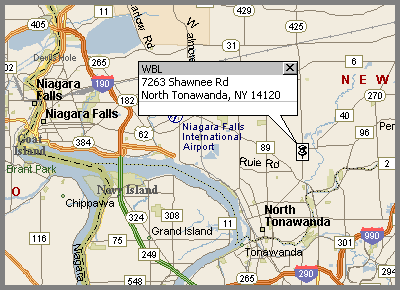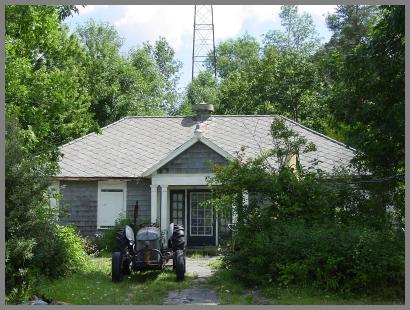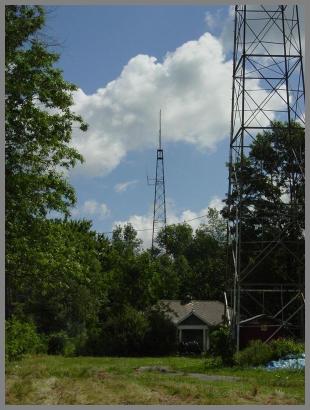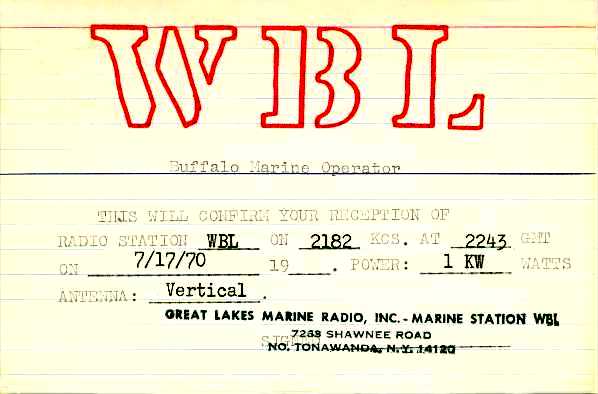
WBL - Buffalo, NY
This Ship-to-Shore station served boats on
the eastern Great lakes - Erie and Ontario. I can only vaguely remember
hearing it, and my personal recollections of it were very limited so
almost all of the information presented here is courtesy of others.
 WBL's last location. There were at least 2 earlier locations in Buffalo proper. |
 WBL building - 2004 photo by Daniel Gurzynsk |
|---|
 WBL site - 2004 photo by Daniel Gurzynski |
WBL
was started by RCA in the
1920s (?)
and was located to serve both the bulk-carriers, and
freighters on the Great Lakes and the St. Lawrence River.
They utilized the 161 KHZ CW band for long distance
communications. On a 24 hour basis the lower frequencies
yield longer distances. Other early (1935) WBL CW frequencies
were: 177, 410 (Distress frequency), 425, 3106, 3120, 4140, 4790, 6330,
6210, and 11205 KHz. |
|---|---|
This long 1954 newspaper article
describes the
importance of the station to Great Lakes shipping, mentions the
increasing radio traffic from foreign ships, gives the cost of calls,
and mentions the names of the staff. There is little about
equipment except mention of the two 147.5 ft. TX towers and that
the receivers are remotely located a half mile away. This RMCA Advertisement is from the little 1955 Great Lakes Redbook.
By 1963 it was apparent from these February
and July
newspaper articles that RCA was not making a profit on the station and
had sought FCC permission to shut it down. Substantial rate
increases and reduced service hours were employed to keep the station,
which shipping interests deemed as essential, operating. New
ownership for the station was also explored at this time, but no
ownership change was made, and RCA continued to operate it.
However, two years later, in February of 1965 this Buffalo Evening News article indicates that RCA had had enough, and would be asking the FCC for permission to close WBL down or would, "practically give it away to any agency interested in maintaining ship-shore radio service."
This RMCA document from sometime in the late 1950s to 1966 gives the WBL frequencies and schedules for one year in that time period. Note that the last paragraph concerns a frequency change for the RMCA inland rivers stations, and indicated that it is scheduled for Oct. 31. Unfortunately I don't know the year of this change.
The last article
in the
newspaper series is from August of 1968 and indicates that the station
was not sold to an agency but instead was sold (in 1965) to Fred G.
DesJardins, RCA's WBL station manager since 1945, and Gregg M. Eberman,
a former broadcast station chief engineer. At this time they
were keeping the station operating 20 hours a day during the shipping
season by working one-man shifts - 70 hours a week each.
Seven AM, three FM and two CW frequencies were in use at this
time. Per the rubber-stamp imprint on the QSL card below
their company was known as Great Lakes Marine Radio, Inc.
At some later time the station was again sold to Robert Schober. Little is known about the station during his ownership.
Here's a blank RCA Radiogram as would have been used by the CW ops at WBL and on the ships communicating with it in the 1940s. Thanks to David Ring, N1EA, and from a later period, we have an RCA Sea-Letter and Telegram Form. Though one of these is from KPH they could also have been used at WBL or on the ships that it communicated with toward the end of the RCA ownership period.

Card courtesy of Phillip Temples - K9HI
Daniel Gurzynski reports that he worked at WBL for a summer in the late 1970’s as an operator, working for Bob Schober part time while going to college. "We connected both private pleasure craft and freighters to landline phone service on VHF at that time. It was usually manned 6am to 12 midnight, 7 days a week in the summer - the busiest time."